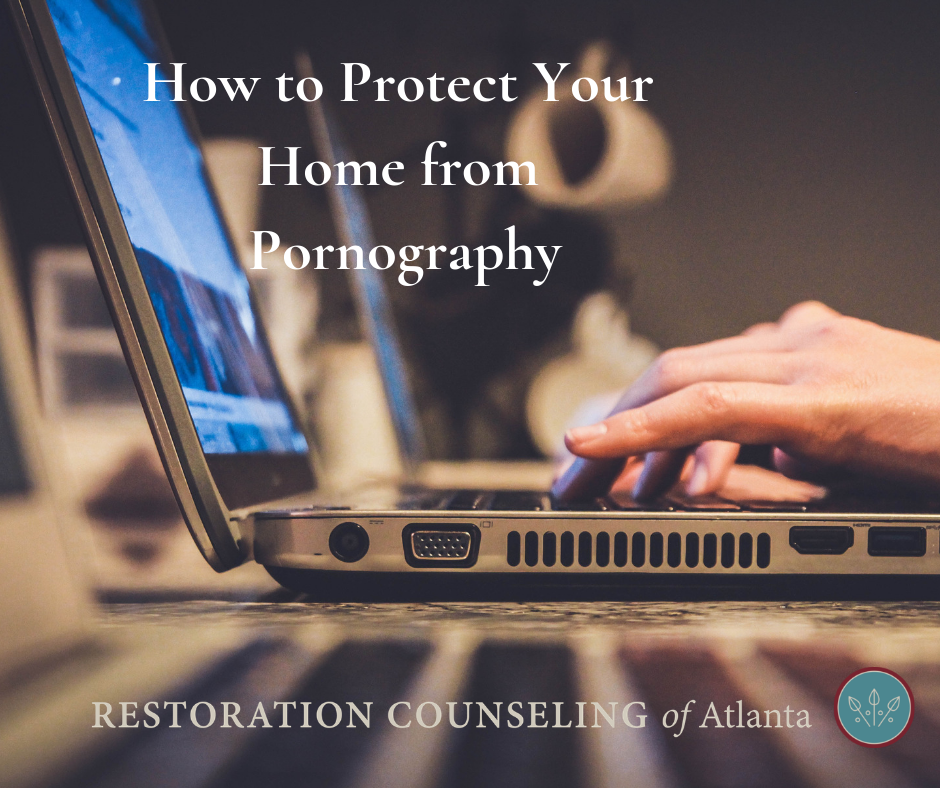Pornography is a real and rising threat across the United States. According to covenanteyes.com, 28,258 users are watching pornography every second and $3,075.64 is spent on porn on the Internet every second. It can be extremely difficult to protect your home from the effects and realization of the porn industry. Troy Snyder, one of our counselors at Restoration Counseling of Atlanta and a Certified Clinical Sexual Addiction Specialist, talks about some practical ways that your family can tackle the issue of pornography in your home.
- Is there a specific person whom I need to worry about being particularly vulnerable to porn? (aka boys, men, children, etc.)
It’s possible for anyone to be exposed to porn. Everyone is vulnerable to becoming addicted to pornography. Statistics say that males, young and old, along with anyone who has open and long-term access to the internet is at risk. This is especially true for those who do not have a protection plan in place.
2. What is the most likely way that someone can view porn or have access to it?
Honestly, just browsing the web without a protection plan and having internet access makes someone susceptible. I also see many people using secondary means of viewing porn by going through an app or by using incognito mode on a browser. Today, if you search almost any topic you are going to come across some level of porn. You can search for all kinds of things on google.
3. Is blocking “bad sites” on our home internet enough?
No, unfortunately not. One needs to have a personal commitment to purity, an accountability plan, and useful digital protection set up. Bad sites only provide the opportunity; the heart and personal pain are the drivers. By the time someone gets to that pornography site, they’ve skipped over the morality issue and have already made the choice. Blocking stops feeding the issues, but it doesn’t stop the issues altogether. However, for kids, we do want to block dangerous sites because that’s a protection mechanism.
I also see low to no education on what healthy sexuality is. When kids don’t understand what healthy and unhealthy sexuality look like, they become curious. That can drive the desire as well. We need to teach truth instead of just blocking sites.
4. Should I be talking to my children about pornography? At what age should I do that?
Yes, you should talk to all your children and don’t just have “the sex talk.” There are great age-appropriate resources out on the market. I think it is important for parents to teach their kids a full view of how God sees healthy sexuality and to come up with an effective plan to maintain their purity, instead of just saying don’t do it. Early age of average exposure to pornography is 8 years old. Talk to your kids before that. With my kids, we went through a book series about healthy sexuality, and we started it when they were 5 years old.
5. How should I bring up pornography to my kids and how do I talk about it in a way that is age appropriate and that actually works?
First, you must be honest with yourself about your own commitment to sexual purity. Parents must know what healthy sexuality is and avoid shaming sex. In addition, instead of having one “sex talk” where you explain what sex is, sexuality should be an ongoing conversation. I have found that the most effective way to teach healthy sexuality is by talking about it often and using situational conversations. Using situational conversations means that when your kids bring things up and ask questions about sex or what something means, use the opportunities. Sexuality is not just “don’t do something bad.” God created our sexuality, and He has a plan for it. Your kids need to know that.
6. How should I bring up and talk about pornography to my significant other?
With prayer and support. Make sure you have that conversation in a safe environment. You want to make sure it’s just the two of you and that you have some time to process afterward. Also, consider giving your spouse permission to talk to some friends. You may also want to consider having a conversation about porn within a counseling situation or with your pastor. You can talk through a pornography addiction on your own, but it’s hard, and support can be helpful for both parties.
7. What are some practical steps I can take to make my house an anti-porn environment?
Pray, study the scripture, and know what healthy sexuality is. I would also research the current technology on the market that covers your home and mobile devices. The ones I recommend are Covenant Eyes and Circles. Keep in mind that the devices and programs only work if they are set up, managed, and customized to meet specific needs. These programs will only be successful when they are used alongside true communication about intention. There needs to be accountability involved. Another thing that is helpful is having an accountability partner. You need people you can trust and talk to about protecting yourself and your family.
8. How do I stay vigilant without becoming paranoid and obsessive about keeping porn out of our household?
Honest communication is key. Limit the number of times you check your family’s/partner’s devices to weekly or bi-monthly. If you have high anxiety about this issue, use your support network to discern the validity of your concerns and address these concerns if needed. The more communication around the issue, the better. The unknown fuels anxiety; you need to have someone safe to talk to about it. If you don’t feel comfortable discussing the issue with a friend, consider seeking counseling to help manage your anxiety around pornography.
9. What should I do if I suspect or know someone in my family or household has a pornography issue?
There is a passage in Scripture that talks about speaking truth in love. This war is not one that should be fought in silence. Pornography and sexual addiction are like mold- they grow in the dark. If you expose mold to the light, it dies. Most people are in denial and hope the pornography issue will go away on its own, but it needs to be exposed in order to be dealt with. You must consider the person and how to best confront them in love. You should address the issue with a heart that wants to help. We should not shame someone struggling with pornography, instead, we should give them support. I would also provide them with resources such as information about helpful books, counseling, and support groups.
Overview
There is a true intent for our sexuality. God wants to use our sexuality for His purpose. We must know what healthy sexuality is and study it. We must be vigilant to fight against all the avenues in which unhealthy sexuality comes. Remember, pornography and unhealthy sexuality don’t just come from the internet- they show up in other areas as well.
Roswell and Woodstock Locations, troy@restorationcounselingatl.com, ext. 113
Troy specializes in three distinct areas: sexual addiction, anger, and adolescent issues. In these specialties, he works with adult males, adolescent males, and couples. He takes a holistic approach to help his clients by working closely with the parents, spouse, family members and friends to help his clients create a better foundation for success. In addition to these specialties, he also provides counseling for all issues relating to men and adolescent boys.


 by
by